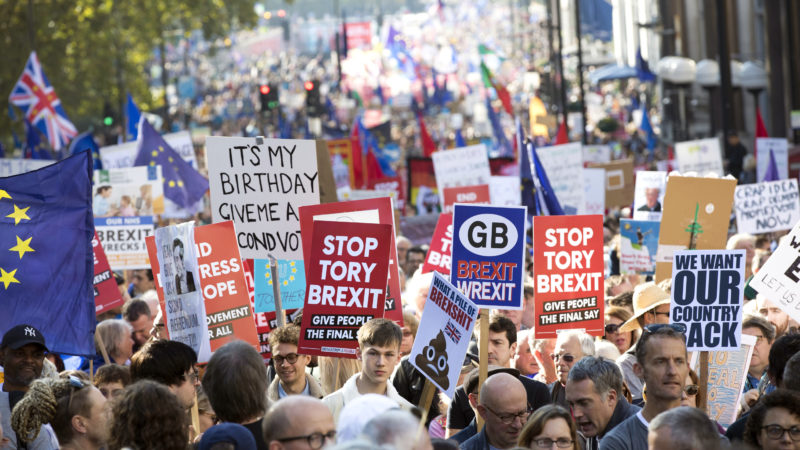
Some Labour MPs are hesitant about holding another EU referendum. Although we understand their caution, the arguments simply don’t stack up.
1. “We’ve had one referendum already and cannot have another.”
Without second referendums, abortion would still be illegal in Ireland and there would be no devolution in Wales and Scotland. Brexit is turning out to be very different from what was promised. The 2016 Leave campaign told lies, exceeded spending limits and misused personal data. Its promises were varied and mutually undeliverable. The government has spent almost three years trying to find a solution without success.
Refusing a new referendum is saying to voters: “You had your say three years ago, so you must now swallow whatever this Tory government comes up with.” Labour representatives don’t say this about any other election outcome! We’re fighters and we’re campaigners. It is incompatible with Labour values to support a right-wing Tory ideological project that will make our constituents poorer.
2. “Labour’s 2017 manifesto said we respected the result of the 2016 referendum.”
The manifesto set out our plans for government. We did not win. If we had, we might have secured a very different Brexit deal to the government’s. Labour respected the result, not because we agreed with it (we campaigned to Remain), but – as democrats – to respect the will of the people. But the will of the people seems to be changing. It would be folly to proceed with a course of action we think is wrong without checking that people still want it.
That is why our conference motion set a new party policy that explicitly envisages the option of a referendum if the Tory deal is rejected and there is no general election. It has the support of most party members. To rule out a referendum goes against party policy and would be a slap in the face for our members.
3. “Labour can’t afford to alienate Leave voters in key seats.”
Even in cities like Wakefield that voted Leave, most voters who identify as Labour voted to Remain. Since then, polls show that the proportion supporting Remain has increased. According to the mega-poll from Survation for Channel 4 a month ago (not based on a sample of a thousand, but one with a sample of over 20,000, with a wide geographical scope and a smaller margin of error than the standard polls), the biggest swing from Leave to Remain has been among Labour voters who voted Leave three years ago (already a minority at the time, now down to around 17% of Labour voters).
Most voters will not change allegiance on this issue alone, but if, say, one tenth do, then Labour candidates risk their seats far more by alienating Labour-supporting Remainers than Leavers.
4. “My constituency voted Leave and opinion has not changed.”
Polling trends are clear: public opinion has not rallied behind the referendum result but has shifted against it. Even if a constituency has not changed from Remain to Leave overall (and many have), virtually all have moved towards Remain in the past year. For example, Wakefield’s Leave vote has gone down from 63% to 53%. You can see how each constituency has changed here.
5. “There is not enough time to hold a referendum before the end of March, when we are due to leave the EU.”
Andrea Leadsom has now admitted that an extension to the 29th March deadline looks necessary anyway, given the delays in parliament. The EU27 would grant an extension to allow the UK to go through a democratic process like a general election or referendum. Extension does not require legislation and the date can be varied by statutory instrument.
6. “There is no guarantee that ‘Remain’ would win.”
If people only did things when they knew the outcome, how many would stand for election? If Leave won a new referendum, that would give legitimacy to the actual deal. If Remain won, it would be equally legitimate as the only vote on the actual deal.
7. “What would the question be?”
Parliament decides. An obvious choice would be Theresa May’s deal or remain.
8. “Another public vote would be divisive.”
Yes, it would be. So would leaving without one. Passions are running high on both sides. Some people just want Brexit to go away. It won’t – if we go ahead with it, there will be years of further difficult negotiations. Best go for the option that is least damaging to our children’s future. And as democrats, we must not be intimidated by far-right activists threatening violence.
9. “Leave won fair and square and we must get on with it.”
Even if you accept that (which we don’t, given the Leave campaign’s questionable use of data, its illegal overspend and its lies), it does not mean the Labour Party should support a damaging, costly, job-destroying, rights-threatening, Tory Brexit. The Labour Party was founded to defend the interests of working people. We must return to our historic mission to protect workers, their jobs and their communities now as never before.
As the Brexit-supporting James Dyson moves his HQ to Singapore, car factories lay workers off and Airbus warns it will end it UK production if there is no deal, the warning signs are clear. Deal or no deal, Brexit will destroy manufacturing jobs in the very towns and cities that voted Leave. It makes sense to keep our options open.
Richard Corbett is MEP For Yorkshire and the Humber and leader of the European Labour Party. Mary Creagh is MP for Wakefield.




More from LabourList
‘Labour is being badly misled on housing’
Reeves bets on patience over populism
‘Energy efficiency changes must work for older private renters’